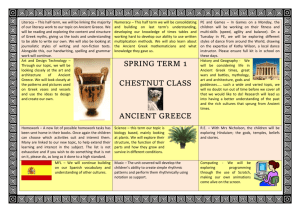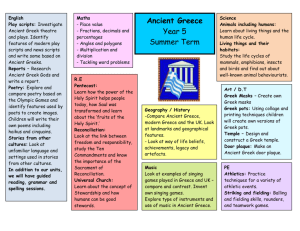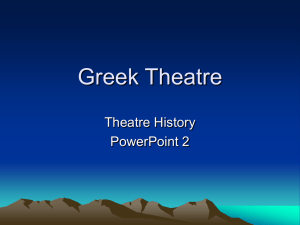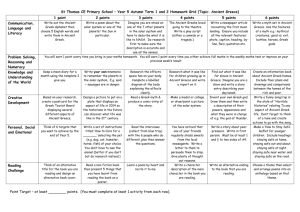Oedipus Web Quest () - North Andover Public Schools
advertisement
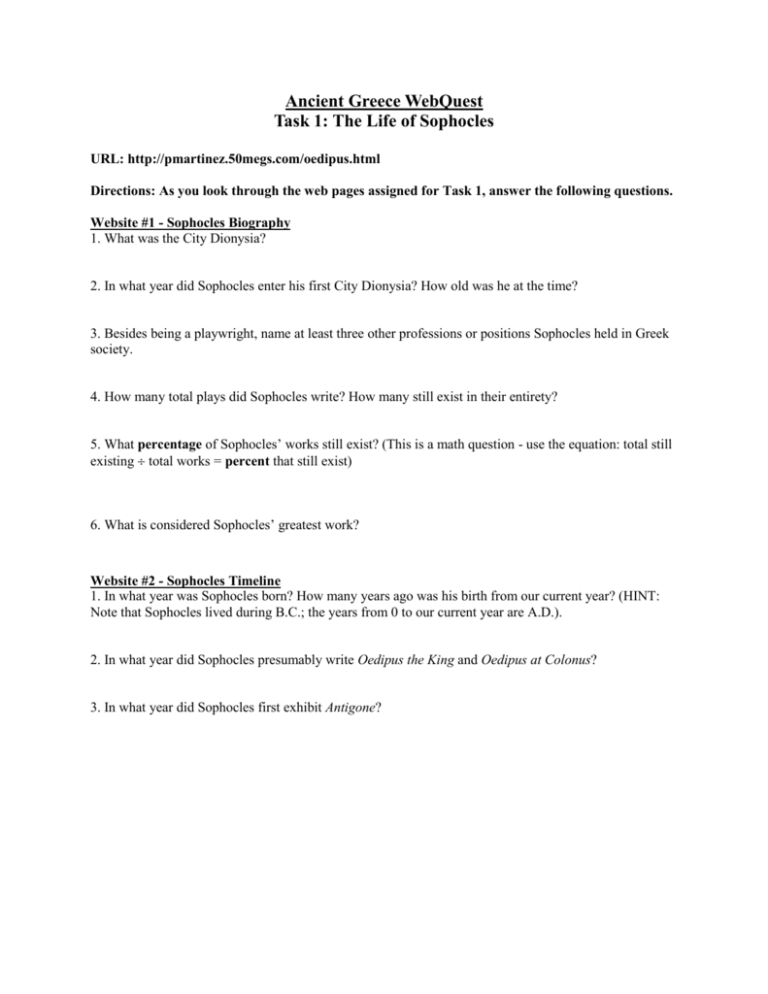
Ancient Greece WebQuest Task 1: The Life of Sophocles URL: http://pmartinez.50megs.com/oedipus.html Directions: As you look through the web pages assigned for Task 1, answer the following questions. Website #1 - Sophocles Biography 1. What was the City Dionysia? 2. In what year did Sophocles enter his first City Dionysia? How old was he at the time? 3. Besides being a playwright, name at least three other professions or positions Sophocles held in Greek society. 4. How many total plays did Sophocles write? How many still exist in their entirety? 5. What percentage of Sophocles’ works still exist? (This is a math question - use the equation: total still existing total works = percent that still exist) 6. What is considered Sophocles’ greatest work? Website #2 - Sophocles Timeline 1. In what year was Sophocles born? How many years ago was his birth from our current year? (HINT: Note that Sophocles lived during B.C.; the years from 0 to our current year are A.D.). 2. In what year did Sophocles presumably write Oedipus the King and Oedipus at Colonus? 3. In what year did Sophocles first exhibit Antigone? Ancient Greece WebQuest Task 2: Greek Life URL: http://pmartinez.50megs.com/oedipus.html Directions: As you look through the web pages assigned for Task 2, answer the following questions. Website #1 – Greek Democracy 1. From what two Greek words do we get the word democracy? 2. What is a polis, and what was the most powerful polis in ancient Greece? 3. List three things that the establishment of democracy allowed citizens of ancient Greece to do. 4. Identify the major differences between the democracy of the ancient Greeks and American democracy today. Website #3 - Burial Rites 1. In ancient Greece, why were the last words spoken by a person before death considered important? 2. Explain the three stages of an ancient Greek funeral. 3. What was the first thing done to prepare a body for burial? Who was responsible for washing the body? 4. Explain why a coin was usually placed in the mouth of a dead body before burial. 5. Describe what happened during the ekphora. Website #4 - Greek Gods and Goddesses In ancient Greece, men and women believed in many different gods and goddesses, and each of these divinities had a special place in Greek life. Use the website to answer the following questions about important Gods and Goddesses that appear in Oedipus the King. 1. Where was Apollo’s oracle placed? Why did people go there? 2. Apollo was brilliant in what two sports? 3. The most important celebration in Athens was dedicated to Athena. What was this celebration called, and how often was it held? 4. Who, in particular, worshipped Artemis in Sparta? 5. How were Ares and Athena different in their roles as war-gods? 6. What was Amphitrite the goddess of? 7. What did people believe they could hear if they visited Zeus’ shrine in Dodona? 8. On what island was Zeus believed to have grown up? Ancient Greece WebQuest Task 3: Greek Theatre URL: http://pmartinez.50megs.com/oedipus.html Directions: As you look through the web pages assigned for Task 3, answer the following questions. Website #1 - Ancient Greek Theatre 1. From what Greek word does the word “theatre” come from? What does this word mean? 2. Of all the plays performed in ancient Greece, how many have been found intact? 3. What god was the Athenian theatre focused on? What was he the god of? 4. List, in order, the three major parts of a Greek play. 5. What were the two major types of Greek plays? 6. Why does it make sense that the term “tragedy” comes from the Greek word for “goat”? Website #2 - Ancient Greek Actors 1. What was the role of the “hypocrits” in ancient Greek theatre? 2. If a play had a female part, who would play this role? 3. Why was the chorus so important in an ancient Greek play? 4. When the chorus first came about, how many members did it have? How many members did Sophocles have in the chorus for one of his plays? 5. List at least four different roles of the chorus in an ancient Greek play. Website #3 - Greek Theatre Masks 1. How many masks survive from the times of ancient Greece? Why? 2. Typically, what materials were used to make Greek theatre masks? 3. What was used for hair on an ancient Greek theatre mask? 4. List characteristics of each of the following types of masks: tragic masks: young man: young woman: comic masks: older man: older woman: male (any age): very old man: other types of women: female (any age):
